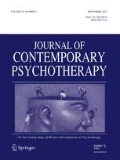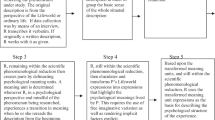Abstract
We contend in this article that the EST movement is becoming an ideological and economic monopoly through the exclusive use of one philosophy of science—empiricism. This epistemology monopolizes the methods that produce the EST’s. We provide lists of the values and assumptions that other scholars have demonstrated is endemic to empirical research, and we provide here an in-depth discussion about one central, uninvestigated value of such research. We, then, show the impact of this value—bias and favoritism—not only on the research itself but also on what is deemed an EST. This is followed by a discussion of a non-monopolistic alternative, an alternative that disallows the relativism and “anything goes” of psychotherapy’s history but avoids the dogmatism of an exclusive ideology.
Similar content being viewed by others
References
Bernstein, R. J. (1983). Beyond objectivism and relativism: Science, hermeneutics, and praxis. Philadelphia, PA: University of Pennsylvania Press.
Bohart, A. C. (2000). Paradigm clash: Empirically supported treatments versus empirically supported psychotherapy practice. Psychotherapy Research, 10(4), 488–493.
Burlingame, G., Fuhriman, A., & Johnson, J. E. (2002). Cohesion in group psychotherapy. In J. C. Norcross (Ed.), Psychotherapy relationship that work (pp. 71–87). Oxford, NY: Oxford University Press.
Capaldi, E. J., & Proctor, R. W. (1999). Contextualism in psychology research? A critical review. Thousand Oaks, CA: Sage Publications.
Curd, M., & Cover, J. A. (1998). Philosophy of science: The central issues. New York: W. W. Norton & Company.
Denzin, N. K., & Lincoln, Y. S. (Eds.) (2000). Handbook of qualitative methods. Thousand Oaks, CA: Sage.
Dupre, J. (1993). The disorder of things: Metaphysical foundations of the disunity of science. Cambridge, MA: Harvard University Press.
Elliott, R. (1998). Editor’s introduction: A guide to the empirically supported treatments controversy. Psychotherapy Research, 8, 115–125.
Eysenck, H. J. (1971). The IQ argument: Race, Intelligence and Education. New York: The Library Press.
Faulconer, J. E., & Williams, R. N. (Eds.) (1990). Reconsidering psychology: Perspectives from continental philosophy. Pittsburgh, PA: Duquesne University Press.
Feyerabend, P. (1975). Against method. London: Verso.
Gadamer, H. G. (1995). Truth and method. (J. Weinsheimer & D. G. Marshall, Trans.) (Revised edition). New York: Continuum. (Original work published 1960).
Green, C. D. (1992). Of immortal mythological beasts: Operationism in psychology. Theory & Psychology, 2, 291–320.
Heiman, G. W. (1995). Research methods in psychology. Boston: Houghton-Mifflin.
Hoshmand, L., & Polkinghorne, D. (1992). Redefining the science-practice relationship and professional training. American Psychologist, 47, 55–66.
Howe, M. J. A. (1997). IQ in question: The truth about intelligence. Thousand Oaks, CA: Sage Publications.
James, W. (1975). Pragmatism. Cambridge, MA: Harvard University Press. (Original work published 1907).
James, W. (1976). Essays in radical empiricism. Cambridge, MA: Harvard University Press. (Original work published 1912).
Joiner, T. E., Jr., Sheldon, K. M., Williams, G., & Pettit, J. (2003). The integration of self-determination principles and scientifically informed treatments is the next tier. Clinical Psychology: Science and Practice, 10, 318–319.
Jones, W. T. (1969). Hobbes to Hume: A history of western philosophy (2nd ed.). San Diego: Harcourt Brace Jovanovich.
Kendall, P. C. (1998). Empirically Supported Psychological Therapies. Journal of Consulting and Clinical Psychology, 66(1), 3–6.
Koch, S. (1992). Psychology’s Bridgman vs Bridgman’s Bridgman. Theory & Psychology, 2, 261–290.
Leahey, T. H. (1991). A history of modern psychology. Englewood Cliffs, NJ: Prentice Hall.
Leahey, T. H. (1980). The myth of operationism. The Journal of Mind and Behavior, 1, 127–143.
MacKenzie, K. R., & Tschuschke, V. (1993). Relatedness, group work, and outcomes in long-term inpatient psychotherapy groups. Journal of Psychotherapy Practice and Research, 2, 147–156.
Messer, S. B. (2001). Empirically supported treatments: What’s a nonbehaviorist to do? In B., Slife, R., Williams, & S., Barlow, (Eds.), Critical issues in psychotherapy: Translating new ideas into practice (pp. 3–20). Thousand Oaks, CA: Sage Publications.
Norcross, J. C. (1999). Collegially validated limitations of empirically validated treatments. Clinical Psychology: Science and Practice, 6, 472–476.
Norcross, J. C. (2002). Empirically supported therapy relationships. In J. C. Norcross (Ed.) Psychotherapy relationship that work (pp. 3–32). Oxford, NY: Oxford University Press.
Polkinghorne, D. (1990). Psychology after philosophy. In J. Faulconer & R. Williams (Eds.), Reconsidering Psychology: Perspectives from Continental Philosophy (pp. 92–115). Pittsburgh, PA: Duquesne University Press.
Polkinghorne, D. (2004). Practice and the human sciences: The case for a judgment-based practice of care. Albany, NY: SUNY Press.
Richards, P. S., & Bergin, A. E. (1997). A spiritual strategy for counseling and psychotherapy. Washington, DC: American Psychological Association.
Richards, P. S., & Bergin, A. E. (2003). Case studies in theistic strategies for psychotherapy. Washington, DC: American Psychological Association.
Richardson, F. C., Fowers, B. J., & Guignon, C. B. (1999). Re-envisioning psychology: Moral dimensions of theory and practice. San Francisco: Jossey–Bass.
Ricoeur, P. (1978). The philosophy of Paul Ricoeur: An anthology of his work. In C. E. Reagan & D. Stewart (Eds.). Boston: Beacon.
Roth, P. A. (1987). Meaning and method in the social sciences: A case for methodological pluralism. Ithaca, NY: Cornell University Press.
Rychlak, J. F. (1981). Introduction to personality and psychotherapy: A theory-construction approach (2nd edition). Boston: Houghton Mifflin.
Rychlak, J. F. (1988). The psychology of rigorous humanism (2nd edition). New York: New York University Press.
Sanderson, W. C. (2003). Why empirically supported psychological treatments are important. Behavior Modification, 27(3), 290–299.
Seligman, M. E., & Csikszentmihalyi, M. (2000). Positive psychology: An introduction. American Psychologist, 55(1), 5–14.
Sheldon, K. M., Joiner, T. E., Jr., Pettit, J. W., & Williams, G. (2003). Reconciling humanistic ideals and scientific clinical practice. Clinical Psychology: Science and Practice, 10(3), 302–315.
Slife, B. D. (2004). Theoretical challenges to therapy practice and research: The constraint of naturalism. In M. Lambert (Ed.), Handbook of psychotherapy and behavior change (pp. 44–83). New York: Wiley.
Slife, B. D. (2005). Testing the limits of Henriques’ proposal: Wittgensteinian lessons and hermeneutic dialogue. Journal of Clinical Psychology, 61, 1–14.
Slife, B. D., & Gantt, E. (1999). Methodological pluralism: A framework for psychotherapy research. Journal of Clinical Psychology, 55(12), 1–13.
Slife, B. D., Smith, A. M., & Burchfield, C. (2003). Psychotherapists as crypto-missionaries: An exemplar on the crossroads of history, theory, and philosophy. In D. B. Hill & M. J. Kral (Eds.), About psychology: Essays at the crossroads of history, theory, and philosophy. (pp. 55–72). Albany, NY: SUNY Press.
Slife, B. D., & Williams, R. N. (1995). What’s behind the research? Discovering hidden assumptions in the behavioral sciences. Thousand Oaks, CA: Sage Publications.
Viney, W. (in press) Pluralism in the sciences is not easily dismissed. Journal of Clinical Psychology.
Viney, W. (1996). Disunity in psychology and other sciences: The network or the block universe. The Journal of Mind and Behavior, 17, 31–44.
Viney, W., & King, D. B. (1998). A history of psychology: Ideas and content (2nd edition). New York: Allyn & Bacon.
Walker, E. H. (2000). The physics of consciousness. New York: Perseus Books.
Watson, J. B. (1913). Psychology as a behaviorist views it. Psychological Review, 20, 158–177.
Widdershoven, G. A. M. (1992). Hermeneutics and relativism: Wittgenstein, Gadamer, Habermas. Journal of Theoretical and Philosophical Psychology, 12, 1–11.
Wilson, G. T. (1995). Empirically supported treatments as a basis for clinical practice: Problems and prospects. In S. C. Hayes, V. M. Follette, R. M. Dawes, & K. E. Grady (Eds.), Scientific standards of psychological practice: Issues and recommendations (pp. 163–196). Reno, NV: Context Press.
Yalom, I. D. (1980). Existential psychotherapy. New York: Basic Books.
Author information
Authors and Affiliations
Corresponding author
Rights and permissions
About this article
Cite this article
Slife, B.D., Wiggins, B.J. & Graham, J.T. Avoiding an EST Monopoly: Toward a Pluralism of Philosophies and Methods. J Contemp Psychother 35, 83–97 (2005). https://doi.org/10.1007/s10879-005-0805-5
Issue Date:
DOI: https://doi.org/10.1007/s10879-005-0805-5




